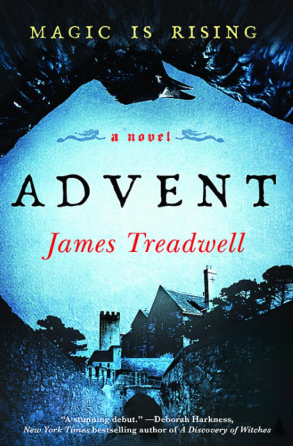By Katie Stobbart (The Cascade) – Email
Print Edition: May 22, 2013
 In a word: compelling. In this debut fantasy novel, Treadwell proves himself a skilled weaver of story and suspense, and lives up to the promises of umpteen reviews on the back cover which compare his work to the novels of Susan Cooper and Philip Pullman.
In a word: compelling. In this debut fantasy novel, Treadwell proves himself a skilled weaver of story and suspense, and lives up to the promises of umpteen reviews on the back cover which compare his work to the novels of Susan Cooper and Philip Pullman.
The story begins with a glimpse of a December night in 1537 and the flight of “the greatest magus in the world.” With him he carries all the magic in the world, and he is headed to attain one of the most famous human desires: immortality. Throughout the novel there are further scenes from the distant past which reveal the magus’ identity and the way his tale intertwines with the events to come.
The main character in the story has less impressive beginnings (isn’t that always the way?) and we first find him on a train from his home in the city to a remote village “as far away as you could go without leaving England altogether.” He is on his way to see his Aunt Gwen in Cornwall but, as the back cover promises, “no one will be there to meet him.”
At first I was concerned that Gavin would be too “nobody-likes-me” and “I’m-so-misunderstood” (while one reviewer cited this attitude as a reason to relate to the main character, I often find it irritating), but I found that I enjoyed watching Gavin’s character develop over the course of the novel, and Treadwell thankfully did not beleaguer the reader with much more “poor-me” from Gavin as Advent progressed.
There are two strong pillars holding up this story. The first is the plot. Advent is suspenseful, intriguing, and full of “Wow, how are you going to tie that in?” elements which did actually integrate. There were some moments, especially in the beginning, when I found myself thinking, “Is this particular thing so important to mention in detail?” But these thoughts were soon followed up with cartoon-style light bulbs illuminating in my head.
The second, which is inexorably tied to the plot, is the wealth of history and mythology contained within this portent of the world’s seemingly inevitable return to magic (or vice versa). The representation of magic in Advent is well thought-out and grounded in that wonderful storytelling realm of “it could actually happen.” Treadwell skilfully uses his knowledge of mythology to suspend disbelief for the reader and freshly interpret some of the more mysterious characters of the past.
The real disappointment of this novel is having to wait for the next book. Advent is the first installment of a trilogy. Its sequel, Anarchy, is set to be released in North America by September, and Treadwell tells readers to prepare themselves for “gods, demons, bicycles and Canadians.” Canadians! And not only Canadians, but apparently Vancouverites! Exciting stuff.
Overall, Advent is an excellent read and though the main protagonists are young, it would be grossly unfair to pigeonhole this novel as exclusively young adult; there is much to entertain the minds of mature readers. I will probably re-read it before reading Anarchy. It is definitely worth bumping to the top of your summer reading list!

